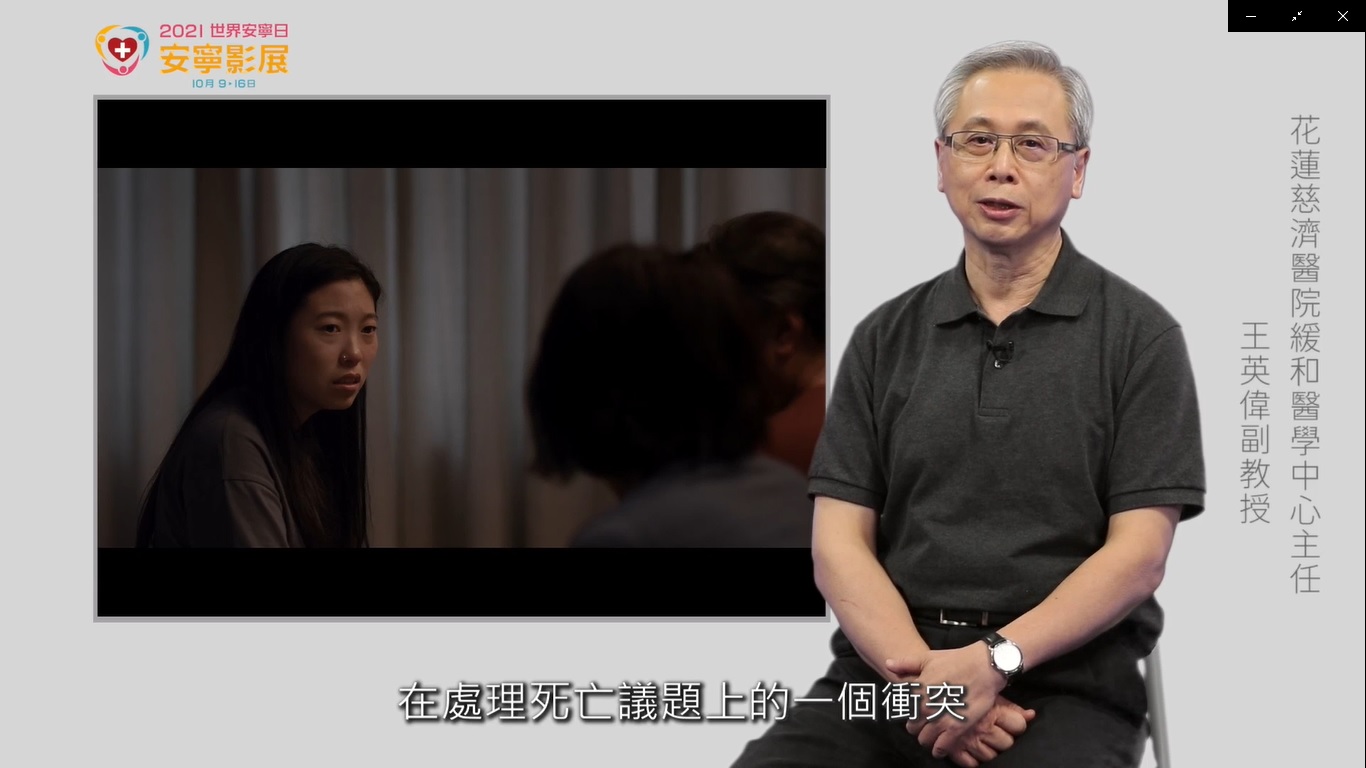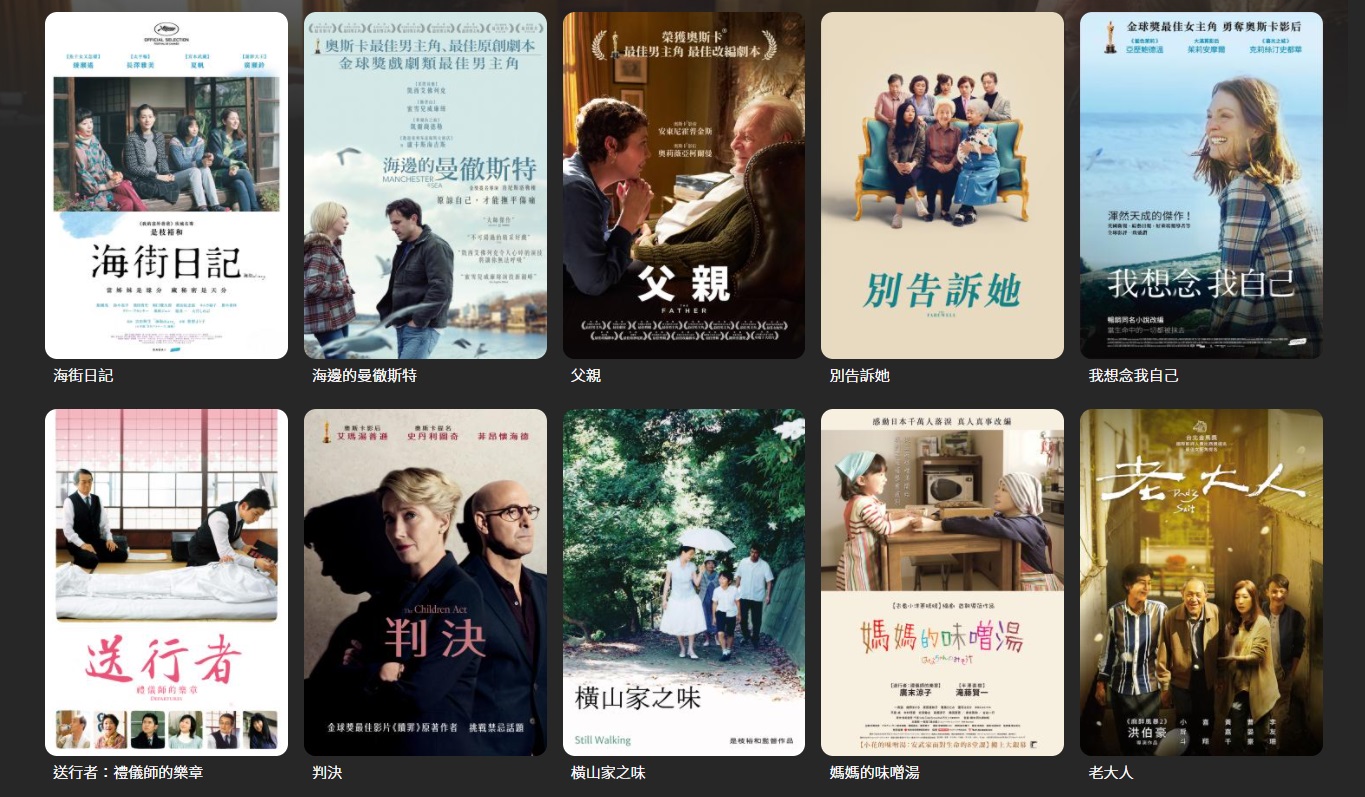
Even though the shadow of the COVID-19 pandemic still looms over Taiwan, the Hospice Foundation of Taiwan moved its annual Hospice Film Festival online this year so that people can watch the beautiful and moving high-quality movies in the safety of their homes, and still feel the spirit and meaning of hospice and palliative care. At the same time, they may be inspired to think more deeply about the value of life.
For fifive consecutive years, the Hospice Foundation of Taiwan (“HFT”), by way of the Hospice Film Festival, has participated in the grand event with the whole world on World Hospice and Palliative Care Day. Through selecting wonderful films related to life issues, HFT hopes to lead the public to better understand hospice and consider about the most important life issues through the reflflections and emotions brought alive by the films. This time, the HFT selected ten wonderful works, consisting of different themes, years, and shooting methods, as the focus of this year's fifilm festival.
As the curator of the Hospice Film Festival, Associate Professor Ya-Wei Wang spoke about the power of drama, that it can not only lead the audience into "their" story as if they were characters in the drama, but also open up reflflections through the approachable plot and make them ponder the taboo and often avoided topic of death. "Let dying well and death be part of life education in the most natural way!" he insists.

Sparkling stars cheer on life at online film festival
Different from the past fifilm festivals that invited guests to interact with the people on site and watch movies together, this year, given the pandemic prevention measures in Taiwan, the Hospice Film Festival cooperated with the film viewing platform myVideo and was held in the form of an online fifilm festival.
The viewing time of the online film festival was flexible, and it was not limited by space.
The themes were more suitable for the entire family to watch together as well. To attract
more people to participate, HFT invited ten well-known hosts, entertainers, physicians, and other industries, to introduce the ten selected fifilms. The stars were glittering, and helped the fifilms to shine online.
Peaceful life and death in rituals; life and death issues under the law
The well-known hostess Shu-Li Chen especially recommended the Japanese drama fifilm Departures, which was released in 2008. The fifilm, based on Shinmon Aoki's memoirs Coffifinman: The Journal of a Buddhist Mortician, was directed by Yojiro Takita and starred Masahiro Motogi, Hirosue Ryoko Hirosue, and Tsutomu Yamazaki. The protagonist in the play was originally a cellist in an orchestra, but he becomes unemployed because of the dissolution of the orchestra. Therefore, he cannot but take his wife back to his hometown and become a mortician in the funeral industry by mere accident.
Shu-Li Chen said that encoffinment is one of the most important rituals for the Japanese. Accompanied by family members, the deceased can be encoffifined with dignity and grace through purifification and makeup. In the process, the hero resists the job of a mortician at fifirst but later realizes that he is responsible for being the bridge between the deceased and his family. In the work of contacting the family again and again, he witnesses the departure of the living and the dead. Finally, he lets go of the hatred that has been entangled in his heart for many years, and forgives his own father, encoffining him himself, and bids a good farewell to his father.
In one scene of the movie, the executor of the crematorium points to the door of the incinerator and says, "This is the door of death, because after passing through this door, we will go to another world." This sentence in this scene became the most impressive scene of the whole fifilm for Shu-Li Chen. She said: "None of us can avoid entering the door of death, but maybe at this moment while we still live, we can start thinking about how to leave and pass through the door of death in the future."
The subject of death is not far away, and in the long journey of life, the choices we
have to make are numerous.
Wan-Ting Hsieh, director of Palliative Medicine Department at Chi Mei Medical Center, recommended the movie The Judgment, which was adapted from the novel of the same name, written by author Ian Russell McEwan, who was also the screenwriter. From the perspective of a female judge of the London High Court who deals with many cases of diffificult family and medical issues, the movie tells how this self-disciplined judge needs to face her own marriage problem and the trial of a case of a juvenile who refuses blood transfusion because of his faith and is about to die, which elicits people's thinking about life choices.
The heroine Fiona is highly respected in the legal profession for her intelligence, fairness, and rigor. One day she takes on a tricky lawsuit: A boy with leukemia who is dying refuses blood transfusion due to religious beliefs, but the hospital, based on humanitarian values, requires forced blood transfusion. Facing with the decision whether to respect the boy’s religious beliefs and let him die naturally becomes the most diffificult judgment Fiona has encountered in her legal career.
Wan-Ting Hsieh, who has been devoted herself to the field of hospice for many years, saw the love between the judge and her husband in the movie and also the love of the juvenile for his parents. Every character is trying their best to explore the meaning of freedom, autonomy, and life and death. Considering the responsibility of the court to interpret the law, she asked, "Can the law measure and determine the value of life, and how does it protect these seemingly conflicting powers?" She continued, "The process of fifinding the answer is diffificult. We can only listen patiently and let mutual respect lead us all forward."

Floating and sinking in memory, but ready to face dementia
This online film festival shared a number of movies on the topic of dementia, which also became a highlight, for example, Still Alice, which has won multiple international fifilm festival awards. The heroine in the fifilm, Alice, works at Columbia University. She is a linguistics teacher admired by her students. She has not only a successful career, but also a warm family as her strongest support; unfortunately, at the early age of 50 she fifinds that she is slowly losing her memory.
Alice not only begins to forget her memories, but she Even forgets the words and sentences for daily communication. In her process of going from resisting seeking medical help to the doctor's diagnosis of early-onset Alzheimer's disease and her family's acceptance, she also falls deep into the valley of melancholy and even tries to commit suicide. It is not until she discovers that this gene might have been inherited and that one of her daughters also has inherited the same gene that Alice begins to have a fighting spirit and becomes determined to face the coming days well. She fifinally instills courage in hoping to spend the last moments in comfort, quality, and good planning.
The film's introducer was a well-known entertainer Cong-Sheng Tang. He said that this film can bring audiences a lot of reflection on issues such as dementia, hospice and palliative care, and the meaning of life when one is facing the end of life. “During the pandemic, when we don't need to go out, I hope that everyone can watch the movie online at home together with the elderly and children in the family to get to know the world and life in advance."
Also about the subject of dementia is the film The Father, which won six nominations in the 93rd Academy Awards. It is about something different from the early-onset of Alzheimer's disease discussed in Still Alice. In The Father, wellknown 83-year-old actor Sir Philip Anthony Hopkins plays the leading role of an elderly person suffering from dementia and trapped in hallucinations. As the course of the illness progresses, the world he knows gradually becomes unfamiliar, and the closest family members in life become the people who have the most conflflicts with him. When the time sequence in his memory grows more and more chaotic, the old man fifinds it hard to distinguish between reality and fantasy. He becomes lost in his and his most beloved daughter is also exhausted in the long-term care center and even worries from time to time that her dear father will forget her one day.
"We can experience the deepest weakness and frustration of families with dementia, as well as the hardship and helplessness of the main caregivers, especially since such plots are actually staged in many families every day." Yuh-Cheng Yang, chairman of Hospice Foundation of Taiwan, also asserted that in order to reduce regret, when an elderly member in the family begins to have symptoms of dementia, family members should help the dementia patient seek medical treatment as soon as possible, and discuss future medical treatment methods and related preparations at the early stage of the disease.
Facing the differing life issues between Eastern and Western cultures
When bad news hits, will you resist or accept it in the very beginning? Does the patient have the right to be informed? The 2019 movie The Farewell was adapted from the personal experience of director Zi-Yi Wang. In the movie, Billie, who grew up in New York, hurries home right after learning that her grandmother is at the terminal stage of lung cancer, only to fifind that her family is preparing a fake wedding to cover up her grandmother's condition so that other family members from different places will come back to see her grandmother for the last time.Billie, who has received Western education since she was a child, cannot accept the deception of her family, and as a result, many conflflicts arise.
Ying-Wei Wang, director of the Center for Palliative Care at Hualien Tzu Chi Hospital, asked the question that, with the conflflicting viewpoints between Eastern and Western cultures, what is the most humanitarian spirit? What is the best thing to do for the grandmother? "There are actually no standard answers," he responded. In the movie, he noted that one can see Billie's change in concept, the interaction in communication, and the exchange of affection with her grandmother. As such, "This process is worthy of everyone's attention."
Ying-Wei Wang recalled that there was a student who used the communication differences between Chinese and Western cultures as the theme of the master's thesis. The thesis pointed out that Eastern people use more circuitous and storytelling methods to present their own ideas, while Western cultures were good at directness. The Farewell also uses a very delicate technique to describe the conflflicts between Chinese and Western cultures on the issue of death.
"What is the best? There is no fifixed answer. We simply need to be understanding," said Ying-Wei Wang, who as a doctor, believes that the best and most appropriate communication and interaction can be achieved through a comprehensive assessment from the perspectives of patients, family members, and culture together.

Companionship to walk through an unbearable past
In the face of death, some people will choose to accept it, some will resist, and still others will be stuck in a sad situation for a long time, unable to free themselves.
The protagonist of Manchester by the Sea, Li, is a depressed repairman. After learning the news of his brother's death, he returns to his hometown Manchester to deal with his brother's funeral and take the role of the guardian of his nephew, which is his brother's last wish.
Facing his nephew's unwillingness to leave the familiar environment and friends, Li seems very anxious. He doesn't want to stay in his hometown for too long, due to a memory that has hurt Li's heart and tortured him for a long time The haunting event of many years ago, which can be attributed to his own fault, resulted in his three children dying in a fifire, and his wife leaving him for this reason. What was once a happy family fell apart overnight.
You-Lung Hei, chairman of Kuangchi News Agency, provides a high evaluation upon Manchester by the Sea. He and his wife even watched it twice. Each time he watched the movie, he felt ripples in his heart, saying, "There are joys and sorrows in life. There are so many setbacks and failures in life. What kind of nourishment is needed to refresh a person?"
For Mr. Hei, the answer is clear and simple. The movie reminds viewers that time has not washed away the great sadness in Li's heart. "Knowing how to share emotions and communicating with each other are the keys to recovery," concludes Mr. Hei.

Working together to see the inside story of the hospice ward
In addition to the online fifilm festival this year, HFT also cooperated with the Taipei Public Access Channel Association to broadcast Walking in the Valley – a special program for World Peace Day. In the two-hour program, several real cases of hospice wards fifilmed by HFT were used to help the audience feel peace and also see the events that occur at a hospice through every moment.
"Even though hospice and palliative care has been developing in Taiwan for more than 30 years, for some people, the word hospice is still a symbol of waiting to die," reflflects Yu-Zheng Yang, who hopes that every hospice story promoted by the special program can help the public to understand that even though life will come to an end, before it does, "hospice care can help the patient to obtain a better quality of life and heal the family members along the way so that they can live a good life even after their loved one dies."


